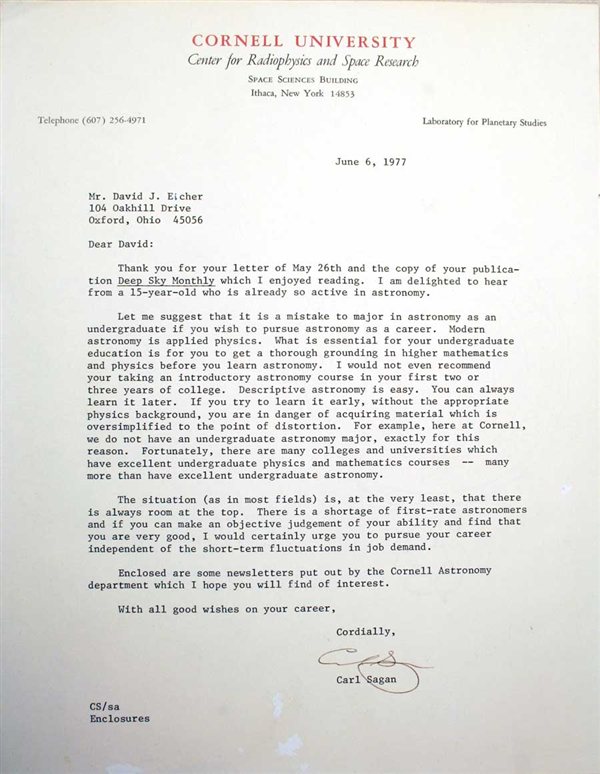 When I was just starting Deep Sky Monthly, my amateurish publication about star clusters, nebulae, and galaxies, I wrote Carl Sagan at Cornell University for astronomy-related career advice. As it turned out, I veered off into astronomy journalism rather than becoming a professional astronomer. Carl was then a renowned professor of astronomy and had regular stints with Johnny Carson on The Tonight Show, but this was before Cosmos, which made Sagan an international icon of astronomy.
When I was just starting Deep Sky Monthly, my amateurish publication about star clusters, nebulae, and galaxies, I wrote Carl Sagan at Cornell University for astronomy-related career advice. As it turned out, I veered off into astronomy journalism rather than becoming a professional astronomer. Carl was then a renowned professor of astronomy and had regular stints with Johnny Carson on The Tonight Show, but this was before Cosmos, which made Sagan an international icon of astronomy.
Anyway, he was good enough to send back a letter to me that started a correspondence and eventual meeting and spending some time with him. (You can read about Sagan’s influence on me, and his meaning to astronomy, in “Remembering Carl Sagan and Cosmos” in the July issue of Astronomy.)
While sorting through papers the other day, I dug out the first letter he wrote to me, which was filled with career advice. It struck me that his thoughts are as relevant today as ever. So I offer the letter to any aspiring young would-be astronomers out there today.
Here goes:
“Dear David / Thank you for your letter of May 26th and the copy of your publication Deep Sky Monthly, which I enjoyed reading. I am delighted to hear from a 15-year-old who is already so active in astronomy.
Let me suggest that it is a mistake to major in astronomy as an undergraduate if you wish to pursue astronomy as a career. Modern astronomy is applied physics. What is essential for your undergraduate education is for you to get a thorough grounding in higher mathematics and physics before you learn astronomy. I would not even recommend your taking an introductory astronomy course in your first two or three years of college. Descriptive astronomy is easy. You can always learn it later. If you try to learn it early, without the appropriate physics background, you are in danger of acquiring material which is oversimplified to the point of distortion. For example, here at Cornell, we do not have an undergraduate astronomy major, exactly for this reason. Fortunately, there are many colleges and universities which have excellent undergraduate physics and mathematics courses — many more than have excellent undergraduate astronomy.
The situation (as in most fields) is, at the very least, that there is always room at the top. There is a shortage of first-rate astronomers, and if you can make an objective judgment of your ability and find that you are very good, I would certainly urge you to pursue your career independent of the short-term fluctuations in job demand.
With all good wishes on your career.
Cordially / Carl Sagan.”